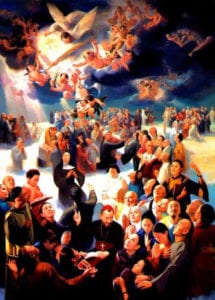
Catechism Lesson 5: The Angels and Saints
What is an angel? An angel is a creature of God. Angels are spirits; they do not have physical bodies like human beings, and they cannot die or perish. God created angels to have superior intelligence and abilities.
The Book of Revelation tells us an important story about the angels:
War arose in heaven, Michael and his angels fighting against the dragon; and the dragon and his angels fought, but they were defeated and there was no longer any place for them in heaven. And the great dragon was thrown down, that ancient serpent, who is called the Devil and Satan, the deceiver of the whole world – he was thrown down to the earth, and his angels were thrown down with him. (Rev 12:7-9)
God created all the angels, but some angels rebelled against God and war broke out in heaven. These angels who rebelled against God were driven out of heaven; they are called “fallen angels,” “demons” or “evil spirits.” They were thrown down to earth where they carry out their evil work of turning men against God until the end of time. On the other hand, the good angels remained in heaven, where they sing glory and praise to God. There are many kinds of angels; some of them are sent by God for the purpose of protecting each human person from harm and evil. These angels are called guardian angels.
What is a Saint? A Saint is someone who has lived a life of heroic virtue, or remained faithful to God through martyrdom, who the Church has declared to have received the reward of eternal life in heaven. A Saint is venerated by the Church as a model and intercessor to the Christian faithful.
The greatest Saint of the Catholic Church is the Blessed Virgin Mary. When the Second Person of the Holy Trinity became man, He was born of the Virgin Mary and was named Jesus. Mary is the mother of Jesus, and because Jesus is God, Mary is also called the Mother of God.
What are Patron Saints? From the earliest days of the Church, the faithful have chosen a Saint as their primary intercessor with God; these Saints are called Patron Saints. Usually, one chooses a Saint with whom one can relate to, or connect to, to be their Patron Saint. But there are also Patron Saints of entire countries and occupations. For example, the Patron Saint of the United States is the Immaculate Conception, which is one of the titles of the Blessed Virgin Mary. Another example is St. Luke the Evangelist, who is one of the Patron Saints of physicians.
Seeking the intercession of a Saint does not mean that one cannot approach God directly in prayer. Rather, it’s like asking a friend to pray for you to God, while you also pray to God. Some people argue that veneration to the Saints detract people from giving emphasis to Christ as our Savior. They say, “Why approach a mere man or woman with our petitions when we can approach Christ directly?” But that way of thinking confuses the role of Christ as Mediator between God and man, with the role of the Saints as intercessors. Scripture urges us to pray for one another (James 5:16, Colossians 1:9, Ephesians 6:18-20); as Christians, we believe that those who have gone to heaven are alive in Christ, and therefore are even more capable, than those of us who are still on earth, of offering prayers to God.
The Hail Mary
Hail Mary, full of grace, the Lord is with thee. Blessed are thou among women, and blessed is the Fruit of thy womb, Jesus. Holy Mary, Mother of God, pray for us sinners, now and at the hour of our death. Amen.
Questions:
- True or False: Angels are creatures; therefore, they die just like human persons.
- True or False: Guardian angels are fallen angels.
- True or False: The greatest Saint in the Catholic Church is the Blessed Virgin Mary.
- True or False: Catholics pray to the Saints because they cannot pray to God directly.
- My Patron Saint is: ____________________